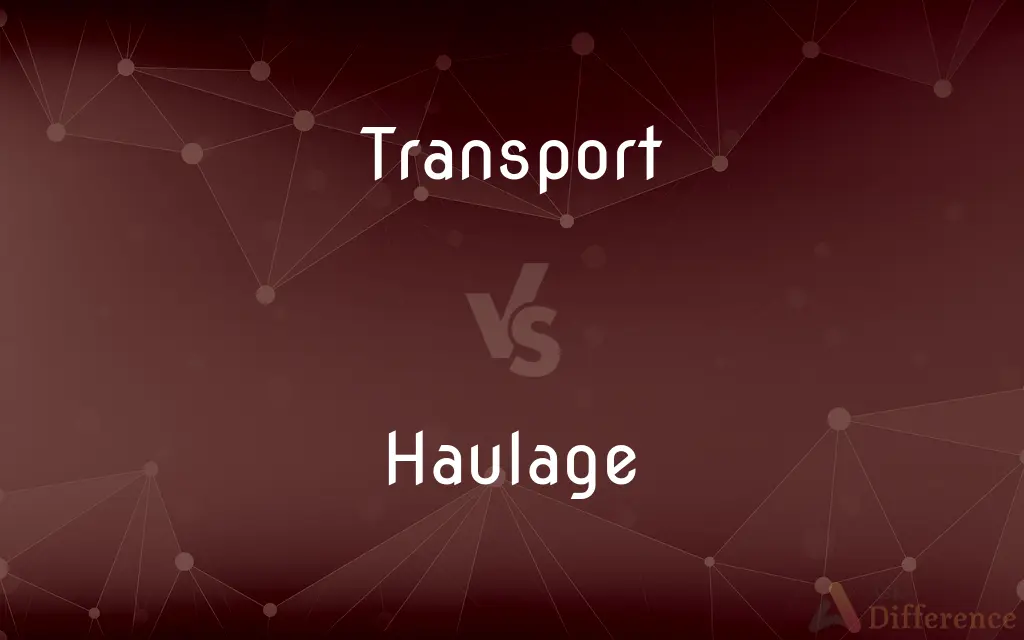Transport vs. Haulage — What's the Difference?
By Maham Liaqat & Fiza Rafique — Updated on March 29, 2024
Transport refers to the movement of goods or people from one place to another, encompassing various modes like road, rail, air, and sea. Haulage, on the other hand, specifically denotes the commercial transport of goods, often involving heavy or bulky.

Difference Between Transport and Haulage
Table of Contents
ADVERTISEMENT
Key Differences
Transport covers a broad spectrum of moving goods and people, employing various modes such as cars, trains, planes, and ships. It's essential for daily commuting, global trade, and tourism, highlighting its versatility in application. Whereas haulage is a subset of transport focusing solely on the commercial transportation of goods. It plays a critical role in supply chains, ensuring products reach from warehouses to stores or direct to consumers.
While transport services cater to both public and private needs, including personal vehicles and public transit systems, haulage services are predominantly business-oriented. They are crucial for industries and retailers, facilitating the movement of merchandise across distances. On the other hand, haulage companies often specialize in specific types of goods, such as hazardous materials or oversized equipment, requiring specialized vehicles and expertise.
Transport infrastructure, like roads, railways, and airports, supports the movement of both people and goods. However, the efficiency and capacity of this infrastructure are critical for haulage operations, where delays can have significant economic impacts. Meanwhile, haulage operations might necessitate investment in specific infrastructure, such as heavy-load bearing roads or logistic hubs, to support the seamless flow of goods.
Regulatory frameworks governing transport are multifaceted, covering safety, environmental standards, and public welfare. Haulage regulations are particularly stringent, focusing on vehicle standards, driver qualifications, and working hours, reflecting the sector's commercial nature and potential risks involved.
The technology adoption in transport includes GPS navigation, electronic ticketing, and smart infrastructure, enhancing efficiency and user experience. In haulage, technology plays a vital role in logistics management, vehicle tracking, and optimizing routes, directly impacting operational costs and environmental footprint.
ADVERTISEMENT
Comparison Chart
Scope
Broad, includes people and goods
Narrow, strictly commercial transport of goods
Modes
Road, rail, air, sea
Mainly road and rail
Purpose
General movement and commuting
Business-to-business goods delivery
Infrastructure
Varied, supports all modes
Specific, heavy-duty infrastructure
Regulations
Diverse, includes safety and environmental
Focused on commercial transport standards
Technology
GPS, electronic ticketing, smart infrastructure
Logistics management, vehicle tracking
Service Recipients
General public and businesses
Primarily businesses
Compare with Definitions
Transport
Regulatory bodies oversee transport safety and standards.
The transport authority introduced new regulations to improve road safety.
Haulage
It plays a key role in logistics and supply chains.
Haulage is critical for delivering goods to remote areas.
Transport
Transport is the act of moving people or goods from one location to another.
The city's public transport system includes buses, trains, and trams.
Haulage
Haulage companies must comply with specific regulations.
Haulage drivers are subject to strict working hours regulations.
Transport
It encompasses various modes such as road, rail, air, and water.
Air transport is the fastest way to travel long distances.
Haulage
Technology is used to optimize routes and track deliveries.
The haulage firm uses GPS tracking to monitor its fleet.
Transport
Transport is crucial for economic development and social interaction.
Efficient transport networks facilitate trade and access to jobs.
Haulage
Specialized vehicles are used for different types of cargo.
Heavy haulage requires trucks capable of carrying oversized loads.
Transport
It involves infrastructure like roads, airports, and ports.
The government announced funding for new transport infrastructure.
Haulage
Haulage refers to the business of transporting goods by road or railway.
The haulage company specializes in transporting refrigerated goods.
Transport
Transport (BE) or transportation (AE) is the movement of humans, animals, and goods from one location to another. In other words, the action of transport is defined as a particular movement of an organism or thing from a point A (a place in space) to a point B. Modes of transport include air, land (rail and road), water, cable, pipeline, and space.
Haulage
Haulage is the business of transporting goods by road or rail between suppliers and large consumer outlets, factories, warehouses, or depots. This includes everything humans might wish to move in bulk - from vegetables and other foodstuffs, to clothes, ore, coal, and other supplies.
Transport
Take or carry (people or goods) from one place to another by means of a vehicle, aircraft, or ship
The bulk of freight traffic was transported by lorry
Haulage
The commercial transport of goods
Road haulage
Transport
Overwhelm (someone) with a strong emotion, especially joy
She was transported with pleasure
Haulage
The act or process of hauling.
Transport
A system or means of conveying people or goods from place to place
Air transport
Many possess their own forms of transport
Haulage
A charge made for hauling.
Transport
An overwhelmingly strong emotion
Art can send people into transports of delight
Haulage
The act of hauling.
Transport
To move or carry (goods, for example) from one place to another; convey.
Haulage
The business of transporting goods.
Transport
To cause to feel strong emotion, especially joy; carry away; enrapture.
Haulage
The charge levied for hauling or pulling a ship or boat.
Transport
To send abroad to a penal colony; deport.
Haulage
Act of hauling; as, the haulage of cars by an engine; charge for hauling.
Transport
The act of transporting; conveyance.
Haulage
The act of drawing or hauling something;
The haul up the hill went very slowly
Transport
The condition of being transported by emotion; joy or rapture.
Transport
A ship or aircraft used to transport troops or military equipment.
Transport
A vehicle, such as an aircraft, used to transport passengers, mail, or freight.
Transport
The system of transporting passengers or goods in a particular country or area.
Transport
The vehicles, such as buses and trains, used in such a system.
Transport
A deported convict.
Transport
To carry or bear from one place to another; to remove; to convey.
To transport goods; to transport troops
Transport
(historical) To deport to a penal colony.
Transport
(figuratively) To move (someone) to strong emotion; to carry away.
Music transports the soul.
Transport
An act of transporting; conveyance.
Transport
The state of being transported by emotion; rapture.
Transport
A vehicle used to transport (passengers, mail, freight, troops etc.)
Transport
(Canada) A tractor-trailer.
Transport
The system of transporting passengers, etc. in a particular region; the vehicles used in such a system.
Transport
A device that moves recording tape across the read/write heads of a tape recorder or video recorder etc.
Transport
(historical) A deported convict.
Transport
To carry or bear from one place to another; to remove; to convey; as, to transport goods; to transport troops.
Transport
To carry, or cause to be carried, into banishment, as a criminal; to banish.
Transport
To carry away with vehement emotion, as joy, sorrow, complacency, anger, etc.; to ravish with pleasure or ecstasy; as, music transports the soul.
[They] laugh as if transported with some fitOf passion.
We shall then be transported with a nobler . . . wonder.
Transport
Transportation; carriage; conveyance.
The Romans . . . stipulated with the Carthaginians to furnish them with ships for transport and war.
Transport
A vessel employed for transporting, especially for carrying soldiers, warlike stores, or provisions, from one place to another, or to convey convicts to their destination; - called also transport ship, transport vessel.
Transport
Vehement emotion; passion; ecstasy; rapture.
With transport views the airy rule his own,And swells on an imaginary throne.
Say not, in transports of despair,That all your hopes are fled.
Transport
A convict transported, or sentenced to exile.
Transport
Something that serves as a means of transportation
Transport
An exchange of molecules (and their kinetic energy and momentum) across the boundary between adjacent layers of a fluid or across cell membranes
Transport
The commercial enterprise of transporting goods and materials
Transport
A state of being carried away by overwhelming emotion;
Listening to sweet music in a perfect rapture
Transport
A mechanism that transport magnetic tape across the read/write heads of a tape playback/recorder
Transport
Move something or somebody around; usually over long distances
Transport
Move while supporting, either in a vehicle or in one's hands or on one's body;
You must carry your camping gear
Carry the suitcases to the car
This train is carrying nuclear waste
These pipes carry waste water into the river
Transport
Hold spellbound
Transport
Transport commercially
Transport
Send from one person or place to another;
Transmit a message
Common Curiosities
What types of vehicles are used in haulage?
Trucks, lorries, and trains are commonly used for haulage, depending on the type of goods.
Can haulage include the transportation of people?
No, haulage is exclusively concerned with the transport of goods.
What role does technology play in modern haulage?
Technology in haulage is crucial for logistics management, route optimization, and vehicle tracking, enhancing efficiency and reducing costs.
How do regulations differ between transport and haulage?
Transport regulations cover a wide range of aspects including safety and environmental standards, while haulage regulations focus more on commercial transport specifics, like vehicle standards and driver working hours.
What is intermodal transport, and how does it relate to haulage?
Intermodal transport involves using two or more modes of transport for a single delivery without handling the freight itself, often including haulage as one segment.
What is the difference between transport and haulage?
Transport is the broader concept of moving goods or people, while haulage specifically refers to the commercial transportation of goods.
Is haulage more expensive than general transport?
Costs can vary, but haulage often involves specialized services and equipment, potentially making it more expensive than some general transport services.
Can individuals access haulage services for personal use?
Typically, haulage services are business-to-business, but individuals may hire such services for moving large items.
How are emerging technologies like autonomous vehicles expected to impact haulage?
Autonomous vehicles could revolutionize haulage by improving safety, efficiency, and reducing labor costs.
How does transport contribute to economic development?
Transport systems facilitate trade, enable access to markets and jobs, and are vital for the movement of goods and people.
Why is infrastructure important for transport and haulage?
Good infrastructure is crucial for efficient transport and haulage operations, reducing delays and costs.
Are there environmental concerns associated with haulage?
Yes, haulage, especially road haulage, can contribute to pollution and carbon emissions, driving efforts to make it more sustainable.
What is meant by logistics in the context of haulage?
Logistics involves planning, implementing, and controlling the efficient, effective forward, and reverse flow and storage of goods between the point of origin and point of consumption.
How do transport and haulage affect urban planning?
Urban planning must consider transport and haulage needs to ensure efficient movement within and outside cities.
How do seasonal demands affect haulage?
Seasonal demands can significantly impact haulage, with certain times of the year seeing increased need for transportation services.
Share Your Discovery

Previous Comparison
Wage vs. Wages
Next Comparison
Tiny vs. TeenyAuthor Spotlight
Written by
Maham LiaqatCo-written by
Fiza RafiqueFiza Rafique is a skilled content writer at AskDifference.com, where she meticulously refines and enhances written pieces. Drawing from her vast editorial expertise, Fiza ensures clarity, accuracy, and precision in every article. Passionate about language, she continually seeks to elevate the quality of content for readers worldwide.
















































